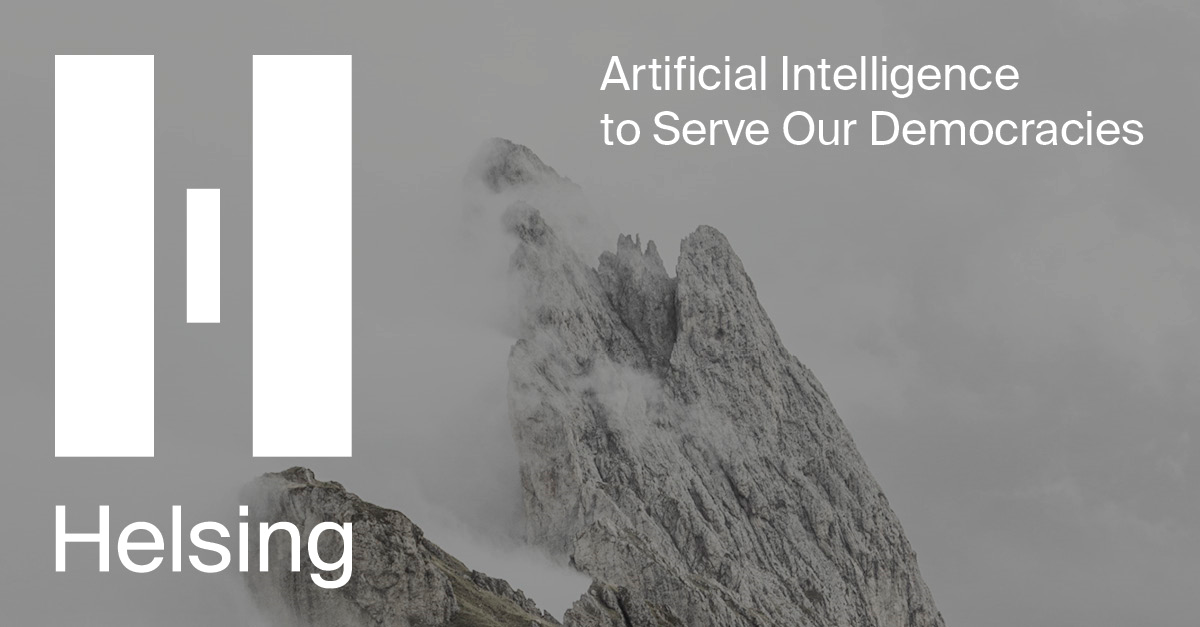The Rise of Helsing: A New Era in Defense Technology Investment
June 18, 2025, 9:34 am
In a world where conflicts shape economies, defense technology is the new gold rush. The latest player in this arena is Helsing, a German startup that recently secured a staggering 600 million euros, or approximately $694 million, in funding. This investment was spearheaded by Prima Materia, the venture capital firm founded by Spotify's Daniel Ek. The infusion of cash marks a significant moment in the defense sector, which has become increasingly attractive to investors amid escalating global tensions.
Helsing, founded in 2021, is not just another tech company. It specializes in artificial intelligence software that processes vast amounts of battlefield data. This technology is crucial for military decision-making, providing real-time insights that can turn the tide in conflicts. The startup has also ventured into manufacturing military drones, specifically the HX-2 model, further solidifying its position in the defense landscape.
The timing of this investment is no coincidence. As geopolitical tensions rise, particularly with the ongoing war in Ukraine and recent escalations in the Middle East, the demand for advanced defense technologies has surged. The NATO Innovation Fund reported that venture funding in Europe’s defense sector reached an all-time high of $5.2 billion in 2024, a remarkable 30% increase over the previous two years. This growth starkly contrasts with the broader venture capital market, which saw a 45% decline during the same period.
Helsing's latest funding round included contributions from notable investors such as Lightspeed Venture Partners, Accel, and General Catalyst, alongside new players like BDT & MSD Partners. This diverse backing underscores the confidence investors have in Helsing's potential to revolutionize defense technology. The firm aims to bolster Europe’s technological sovereignty, focusing on developing critical technologies like AI within the continent.
Daniel Ek's involvement is particularly noteworthy. As the founder of Spotify, he has a track record of identifying and nurturing innovative ventures. His role as chairman of Helsing signals a strategic pivot from entertainment to defense, reflecting a broader trend among tech leaders who are increasingly looking to invest in sectors that promise both growth and societal impact.
The implications of this investment extend beyond financial metrics. Helsing's mission aligns with a growing recognition of the need for Europe to enhance its defense capabilities. The continent faces a unique set of challenges, from external threats to internal security concerns. By investing in advanced technologies, Helsing aims to ensure that Europe can maintain its strategic autonomy and readiness in an unpredictable world.
The startup's focus on AI-driven solutions is particularly relevant. In an age where data is often referred to as the new oil, the ability to analyze and act on information swiftly can be a game-changer in military operations. Helsing's software is designed to sift through sensor data and weapon systems, providing military leaders with actionable insights. This capability is not just about efficiency; it can mean the difference between victory and defeat on the battlefield.
Moreover, Helsing's expansion into drone manufacturing highlights a significant trend in modern warfare. Drones have become indispensable tools for surveillance and combat, offering capabilities that traditional military assets cannot match. By developing its own line of drones, Helsing positions itself as a key player in a rapidly evolving market.
As Europe grapples with its defense strategy, the role of private investment cannot be overstated. The traditional reliance on government funding for defense projects is shifting. Private capital is stepping in, driven by the promise of innovation and the urgency of current geopolitical realities. Helsing's success could pave the way for other startups in the defense sector, creating a ripple effect that transforms how Europe approaches its security challenges.
The funding round also reflects a broader trend in venture capital. Investors are increasingly drawn to sectors that address pressing global issues. Climate tech, health tech, and now defense tech are capturing attention as areas ripe for disruption. The urgency of the current geopolitical climate has made defense technology a priority, attracting a diverse array of investors looking to make a meaningful impact.
However, this shift is not without its challenges. The defense sector is fraught with ethical considerations. The implications of AI in warfare raise questions about accountability and the potential for misuse. As Helsing and similar companies push the boundaries of technology, they must navigate these complex moral landscapes. The balance between innovation and responsibility will be crucial as they forge ahead.
In conclusion, Helsing's recent funding round is a landmark moment in the defense technology landscape. With Daniel Ek at the helm, the startup is poised to make significant strides in a sector that is becoming increasingly vital. As Europe seeks to enhance its defense capabilities, investments in advanced technologies like those offered by Helsing will play a crucial role. The intersection of technology and defense is a new frontier, one that promises both challenges and opportunities. The world will be watching as Helsing charts its course in this high-stakes arena.
Helsing, founded in 2021, is not just another tech company. It specializes in artificial intelligence software that processes vast amounts of battlefield data. This technology is crucial for military decision-making, providing real-time insights that can turn the tide in conflicts. The startup has also ventured into manufacturing military drones, specifically the HX-2 model, further solidifying its position in the defense landscape.
The timing of this investment is no coincidence. As geopolitical tensions rise, particularly with the ongoing war in Ukraine and recent escalations in the Middle East, the demand for advanced defense technologies has surged. The NATO Innovation Fund reported that venture funding in Europe’s defense sector reached an all-time high of $5.2 billion in 2024, a remarkable 30% increase over the previous two years. This growth starkly contrasts with the broader venture capital market, which saw a 45% decline during the same period.
Helsing's latest funding round included contributions from notable investors such as Lightspeed Venture Partners, Accel, and General Catalyst, alongside new players like BDT & MSD Partners. This diverse backing underscores the confidence investors have in Helsing's potential to revolutionize defense technology. The firm aims to bolster Europe’s technological sovereignty, focusing on developing critical technologies like AI within the continent.
Daniel Ek's involvement is particularly noteworthy. As the founder of Spotify, he has a track record of identifying and nurturing innovative ventures. His role as chairman of Helsing signals a strategic pivot from entertainment to defense, reflecting a broader trend among tech leaders who are increasingly looking to invest in sectors that promise both growth and societal impact.
The implications of this investment extend beyond financial metrics. Helsing's mission aligns with a growing recognition of the need for Europe to enhance its defense capabilities. The continent faces a unique set of challenges, from external threats to internal security concerns. By investing in advanced technologies, Helsing aims to ensure that Europe can maintain its strategic autonomy and readiness in an unpredictable world.
The startup's focus on AI-driven solutions is particularly relevant. In an age where data is often referred to as the new oil, the ability to analyze and act on information swiftly can be a game-changer in military operations. Helsing's software is designed to sift through sensor data and weapon systems, providing military leaders with actionable insights. This capability is not just about efficiency; it can mean the difference between victory and defeat on the battlefield.
Moreover, Helsing's expansion into drone manufacturing highlights a significant trend in modern warfare. Drones have become indispensable tools for surveillance and combat, offering capabilities that traditional military assets cannot match. By developing its own line of drones, Helsing positions itself as a key player in a rapidly evolving market.
As Europe grapples with its defense strategy, the role of private investment cannot be overstated. The traditional reliance on government funding for defense projects is shifting. Private capital is stepping in, driven by the promise of innovation and the urgency of current geopolitical realities. Helsing's success could pave the way for other startups in the defense sector, creating a ripple effect that transforms how Europe approaches its security challenges.
The funding round also reflects a broader trend in venture capital. Investors are increasingly drawn to sectors that address pressing global issues. Climate tech, health tech, and now defense tech are capturing attention as areas ripe for disruption. The urgency of the current geopolitical climate has made defense technology a priority, attracting a diverse array of investors looking to make a meaningful impact.
However, this shift is not without its challenges. The defense sector is fraught with ethical considerations. The implications of AI in warfare raise questions about accountability and the potential for misuse. As Helsing and similar companies push the boundaries of technology, they must navigate these complex moral landscapes. The balance between innovation and responsibility will be crucial as they forge ahead.
In conclusion, Helsing's recent funding round is a landmark moment in the defense technology landscape. With Daniel Ek at the helm, the startup is poised to make significant strides in a sector that is becoming increasingly vital. As Europe seeks to enhance its defense capabilities, investments in advanced technologies like those offered by Helsing will play a crucial role. The intersection of technology and defense is a new frontier, one that promises both challenges and opportunities. The world will be watching as Helsing charts its course in this high-stakes arena.

